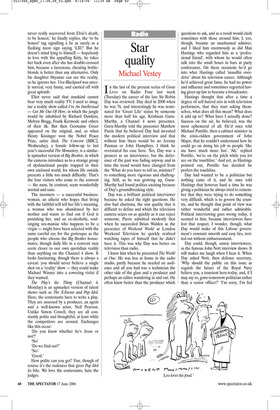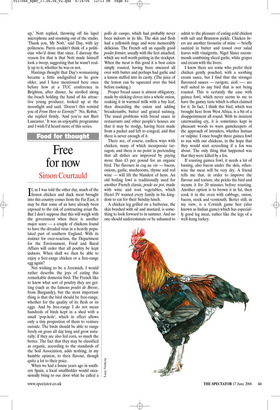Star quality
Michael Vestey
In the last of the present series of Great Lives on Radio Four last week (Tuesday) the career of the late Sir Robin Day was reviewed. Day died in 2000 when he was 76, and interestingly he was nominated for ‘Great Life’ status by someone more than half his age, Krishnan GuruMurthy, a Channel 4 news presenter. Guru-Murthy told the presenter Matthew Parris that he believed Day had invented the modern political interview and that without him there would be no Jeremy Paxman or John Humphrys. I think he overstated his case here. Yes, Day was a pioneer as an interviewer, but the deference of the past was fading anyway and in time the trend would have changed from the ‘What do you have to tell us, minister?’ to something more vigorous and challenging. Still, as he was growing up, GuruMurthy had found politics exciting because of Day’s groundbreaking style.
Day was a brilliant political interviewer because he asked the right questions. He also had charisma, the star quality that is difficult to define and which the television camera seizes on as quickly as it can reject someone. Parris admitted modestly that when he succeeded Brian Walden as the presenter of Weekend World at London Weekend Television he quickly realised watching tapes of himself that he didn’t have it. This was why Day was better on television than radio.
I knew him when he presented The World at One. He was less at home in the radio studio, partly because he needed an audience and all you had was a technician the other side of the glass and a producer and perhaps an editor wandering in and out. He often knew better than the producer which questions to ask, and as a result would clash sometimes with those around him. I, too, though, became an unashamed admirer, and I liked him enormously as did Max Hastings who regarded him as a ‘professional friend’, with whom he would often talk into the small hours in bars at party conferences. On these occasions he’d go into what Hastings called ‘maudlin overdrive’ about his television career. Although he’d achieved great fame, he had no power and influence and sometimes regretted having given up law to become a broadcaster.
Hastings thought that after a time a degree of self-hatred sets in with television performers, that they start asking themselves, what does all this mean? What does it add up to? What have I actually done? Success on the air, he believed, was the most ephemeral of all. He’d once told Michael Portillo, then a cabinet minister in the crisis-ridden government of John Major, that he couldn’t understand how he could go on doing his job as people ‘like me have much more fun’. ‘Ah,’ replied Portillo, ‘we’re on the pitch while you lot are on the touchline.’ And yet, as Hastings pointed out, Portillo has decided he prefers the touchline.
Day had wanted to be a politician but nothing came of it, and he once told Hastings that however hard a time he was giving a politician he always tried to remember that they were trying to do something very difficult, which is to govern the country, and he thought that point of view was rather wonderful and rather admirable. Political interviewing goes wrong today, it seemed to him, because interviewers have lost that respect. I wonder, though, what Day would make of this Labour government’s constant smooth and easy lies, trotted out without embarrassment.
Day could, though, annoy interviewees, as the famous John Nott interview shows. It still makes me laugh when I hear it. When Day asked Nott, then defence secretary, ‘Why should the public on this issue as regards the future of the Royal Navy believe you, a transient here-today, and, if I may say so, gone-tomorrow politician rather than a senior officer?’ ‘I’m sorry, I’m fed up,’ Nott replied, throwing off his lapel microphone and storming out of the studio. ‘Thank you, Mr Nott,’ said Day, with icy politeness. Parris couldn’t think of a politician who’d done that since. I daresay the reason for that is that Nott made himself look a twerp, suggesting that he wasn’t really up to it, whether he was or not.
Hastings thought that Day’s womanising became a little undignified as he grew older, and I have mentioned here once before how at a TUC conference in Brighton, after dinner, he strolled along the beach holding the hand of his attractive young producer, looked up at the moonlight and said, ‘Doesn’t this remind you of From Here to Eternity?’ ‘No, Robin,’ she replied firmly. ‘And you’re not Burt Lancaster.’ It was an enjoyable programme and I wish I’d heard more of this series.



















































































 Previous page
Previous page